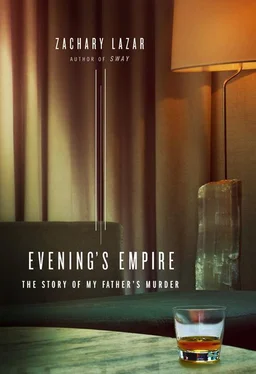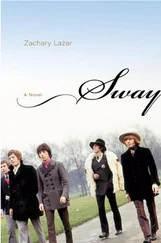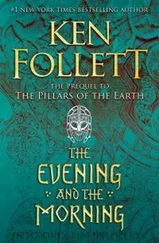“I met with Dave this morning.”
“He has a good accent. Everyone loves him for that accent.”
“He was telling me about Lee Ackerman. Your old friend, or your old nemesis. I still don’t understand the story.”
Warren put his hand on Ed’s shoulder and led him to the glass table. “Let’s talk,” he said. “I want to talk to you about this because I think you’ll understand it from a business angle. You know the language — I don’t think most people understand the language very well. Very few do anyway. It’s boring, it doesn’t make sense to them.”
The weather was bright and warm, and the pale water in the pool shimmered — blurry, blue lattices forming and unfolding on the surface. Ed put his Scotch down on the table, rolled up his sleeves, sat down in the shade of the umbrella. Warren lit a cigarette. They talked for almost two hours. Barbara came out periodically to freshen their drinks and would sometimes lean for a while on Warren’s chair and listen to what he was saying, silent, thoughtful. At one point, there was a clamor inside when the children came home from school. The Dobermans got out, racing around and then into the pool until Warren clapped his hands and they panted and bobbed around the glass table, shaking water from their gleaming backs. One of Warren’s daughters came to take the dogs back inside, a pretty, blond girl who said hello and did a stiff pretend curtsy, laughing, the formal gesture some sort of joke between her and her father. When she went back inside, Warren reclined further in his chair.
“Lee Ackerman had no sense of timing,” he said. “He bought my shares at a bad time. It’s not a beauty pageant, it’s business, but everything I’ve done here is legal.”
Ed looked out at the pool, then up and across the mountainside, the houses hanging like small fortresses out of the rock, the blue sky above them. He had finished a second and then a third Scotch. “I don’t see how anyone stays in the land business for very long,” he said. “I don’t like the way the financing works. To me, it seems like it gets very close to a Ponzi scheme sometimes.”
“Eighteen months,” Warren said. “I like to build up a company for about eighteen months and then I like to sell it to someone else. After that, you really need someone who can manage money, someone who knows how to structure a company’s finances. I like making money, but I’m not an accountant.”
Ed smiled. “You’re not an accountant. What’s that supposed to mean?”
“You know what it means.”
“No, I don’t,” Ed said, not smiling anymore.
“I guess it means that I don’t know how you can stand doing taxes every year for some of the people you must have to work for. That’s what it means. You don’t seem like the type.”
“It’s not so bad.”
“It’s steady work. I understand that. Maybe I’m too much the other extreme. That’s what used to get me into trouble.”
It had all come out in their conversation — Warren’s wayward past, the stories from a dozen years ago, twenty years ago, from when he was, for lack of a better term, a grifter. He had raised money for a concert for the blind, but the concert had never happened. He had found backers for a Broadway musical that also had never happened, though he had produced a script and a title— The Happiest Days —and billed Lucille Ball and June Allyson as the stars and hired a famous publicist, Chick Farmer, to promote it in the newspapers. He had spent a year in Sing Sing for The Happiest Days. You pictured him in a prison suit with a number on his chest, sawing his way through the bars with a file taken out of a cake — that was how real the time in Sing Sing seemed. It was hard to connect it to the fifty-three-year-old man sitting by the pool in his robe, a man who’d been to Europe, to New York, to Asia, a man whose financial statement linked him to some of the most important people in Phoenix — a man who understood the detailed complexities of his financial statement. To take his past seriously seemed to imply a lack of a sense of humor, a missing sense of joie de vivre. He was like Dean Martin, Ed thought. He had Dean Martin’s thick crest of hair and his low-key, half-shrugging delivery. Like Dean Martin, he came across as a charming rogue, a man who had lived through all manner of disorder and yet had managed to land on his feet.
Barbara came out again, not to freshen their drinks this time but holding a tray with a great pitcher of ice water and some glasses. There were napkins so white they left a blind spot in your field of vision for a moment. There was a silver bowl of guacamole with peeled shrimp arrayed along the rim.
“We’re having some guests come by for dinner in a little while,” she said to Ed. “Around eight o’clock. Would you like to join us? I was thinking you could call your wife and see if she wanted to join us, too. I realize it’s very short notice.”
Ed sat with his hands on the aluminum arms of his deck chair. He had lost track of the time, but now he roused himself. “I’m sorry,” he said. “I should let you get ready.”
“Don’t be ridiculous.”
“No, of course. I really have to go anyway. We have a baby at home, I shouldn’t have stayed so long.”
Warren was reaching for a shrimp. Barbara was standing behind him with her hand on his shoulder, as if to balance herself, while she inhaled from her cigarette.
Ed stood up and shook their hands. Then Barbara followed him into the sunroom, where he found his briefcase and his jacket and said a last good-bye. A part of him had wanted to stay for dinner, he realized. It surprised him that a part of him had wanted to stay for dinner.

4958 East Grandview Lane
Their neighborhood was tract houses. You picked one of five models from a book and then six months later you had neighbors who all had kids and bicycles and two cars.
“I can’t believe we’re living in a Norman Rockwell neighborhood,” he said one day to Susie out of nowhere — one of those sudden views into something deeper that she had gotten accustomed to by now, Ed’s occasional urge for something more or something else. She didn’t know what to say, what more or what else could really make him any happier. They had a son, Zachary, whom he doted on, and his relationship with his other son, Richie, was different now, infused with his new understanding of what it meant to be a father. He played tennis several times a week, the game at his level an intense blending of the physical and the mental, a rapid blur of angles and approaches, satisfying, exhausting. On Saturday nights during football season, they went to the ASU games, the men in slacks and button-down shirts, the women in skirts and nylon stockings, all of that clothing in the 90-degree heat; and then afterward, during a late dinner and drinks in a Mexican restaurant, the darkness and coolness were soothing, you felt you were on vacation, that your life itself contained many of the elements of a vacation. It was a weekend life, an after-work life. It seemed perfect to him almost all of the time, as long as he was in it and not in his office.
It was not that he wanted material things: a boat, a second home, a luxury car. Things didn’t interest him — what they signified had begun to interest him. In the office, there were subtle, newly unexpected humiliations that went along with the servicing of clients. They always wanted you to keep in mind, through a kind of code, how much money they made in relation to how much money you made. The code was simple — your car, the neighborhood you lived in, the stocks you owned, the pastimes you pursued. In the Midwest, no one would have questioned you about these subjects with such hungry interest. In Phoenix, because it was sunny, because you could play tennis every month of the year, could swim and play golf every month of the year, there was a competition to be more fun-loving, more free spirited than everyone else. There are very few people in America who don’t want to be fun-loving, free-spirited — Ed was both of these things by nature, he didn’t have to pursue them. But he was learning, as people learn in all times and places, that the easiest way to remain fun-loving and free-spirited is to have a lot of money.
Читать дальше













